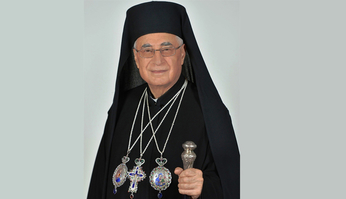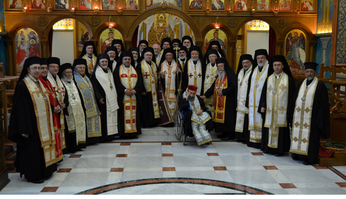Patriarch Youssef
Patriarch at the Vatican, 19-22 November 2013
Meeting of Pope Francis with the Eastern Catholic Patriarchs,
Assembly of the Congregation for the Oriental Churches
Gregorios III: “Frank, constructive conversations for the good of our Churches.”
(2).jpg)
Last Thursday 21 November 2013, the Feast of the Presentation of the Mother of God in the Temple, was the day when the Patriarchs and Major Archbishops of the Eastern Catholic Churches who had gathered together in Rome met with Pope Francis. This meeting followed in the wake of one organised by Benedict XVI in September 2009. Welcoming the Holy Father to Jordan in May of that year, Gregorios III had asked him to enable the Eastern Catholic Patriarchs to meet regularly with him.
The meeting of 21 November, which was characterised by ecclesial brotherliness, listening, frankness, sincerity and simplicity, took place during the work for the General Assembly of the Congregation for the Oriental Churches held from 19 to 22 November. On 24 November the Patriarchs will be with Pope Francis to celebrate the closure of the Year of Faith as “a sign of their determination to live out in full communion with Peter’s successor the mission entrusted to their Churches by the Council: generously witnessing witness to faith in order to foster Christian unity, especially in the East.”
The Eastern Catholic Churches fifty years after the Second Vatican Council was the central theme of the Assembly of the Congregation for the Oriental Churches. Five talks illustrated the theme: the role of Eastern Christians and their influence on Vatican II: ecclesial and ecumenical issues; pastoral mission between East and West; the diaspora of Eastern Christians; the impact of Vatican II on the relations between the Eastern Churches and Rome, and on the daily life of the Eastern Churches.
The work of the meeting allowed everyone to talk simply and frankly without any taboo or forbidden topic and this lead to a constructive dialogue which touched on critical issues such as: patriarchal authority outside patriarchal territories, the authority of patriarchs in the Gulf, lifting the prohibition on Eastern Churches appointing married priests outside their patriarchal territories, working relations with the Congregation for the Oriental Churches...
The meeting with Pope Francis began with a joint prayer, at the end of which Cardinal Leonardo Sandri addressed the Holy Father, who greeted all the participants. Cardinal Rai, Patriarch of the Maronites then took the floor to present to the Pope the various documents of the Assemblies of Eastern Catholic Patriarchs. The discussion was then opened up and everyone was able to talk simply and frankly.
No press release was issued after this meeting. The matters broached and addressed have to be further explored and studied before being re-submitted to the Holy Father, and only then will decisions be able to be taken.
What was important in this meeting was simply the quality of the debate and the possibility given to each one to speak directly to the Holy Father in a frank and constructive dialogue. The situation in Arab countries was obviously at the heart of all the issues discussed. All the Patriarchs had gratefully hailed Pope Francis’ call for 7 September to be a day of fasting and prayer for peace in Syria and in the Middle East, as they had requested constant efforts and appeals for prayer and peace and for them to be the subject of continuous focus on the part of the Congregation for the Oriental Churches and the Holy Father.
Peace is the primordial condition for the sustainability of Christians’ presence and role in their countries in the Middle East for everyone’s benefit; for curbing the exodus of Christians and its tragic consequences; for Muslim-Christian dialogue and knowing how to live together with Islam; for preserving liberties.
On the evening of 21 November, and on the occasion of Lebanon’s national day, Gregorios III together with the Maronite Patriarch, Cardinal Beshara Boutros al-Rai, the Armenian Catholic Patriarch, Nerses Bedros XIX, and the Syriac Catholic Patriarch, Ignatios Joseph III Younan, went to the Lebanese Embassy to celebrate the seventieth anniversary of Lebanese independence.
Address of HB Patriarch Gregorios III
To HH Pope Francis
At the Vatican, 21 November 2013
Most Holy Father
-
The Patriarchate of the Melkite Greek Catholic Church has its headquarters in Damascus, capital of Syria, the country that Your Holiness has often described as “beloved,” in your repeated appeals to the international community, for which we can never thank you enough, as they prevented a potentially disastrous military attack from abroad.
As President of the Assembly of Catholic Hierarchs in Syria, I should like to talk to you about the tragic situation, which is a real way of the cross for our faithful and other Christians in this country, without in any way forgetting the problems of our brothers and sisters in Lebanon, Palestine, Jordan, Iraq and Egypt.
All we Christians and Muslims are implicated as victims in this bloody conflict, which has lasted now for over two and a half years.
-
In Syria, all Churches and all Christians are in favour of reforms, but not through violence. The Patriarchs and other church leaders have unanimously and frequently called for reconciliation. It is important for Europe to be aware of this and take it into consideration.
But of the one million seven hundred thousand Christians living in Syria three years ago, nearly half a million are now internally displaced inside the country or temporarily living as refugees in neighbouring countries. Furthermore, some sixty churches have been destroyed or damaged, without counting the wrecking of several of our schools and hospitals, and millions of homes and businesses.
There are also one thousand two hundred dead from among our communities (out of over one hundred and twenty thousand dead since March 2011), some of whom were real martyrs, notably at Ma’alula.
-
Right from the beginning of the crisis, the Churches placed themselves at the service of all in need in all our eparchies, and especially in our Patriarchate in Damascus. Caritas-Syria co-ordinates aid throughout the country, and should be the European Community’s preferred partner for humanitarian aid in Syria.
In August, welcoming a delegation from the European Community, I told them, “Give us peace, not weapons.”
At stake are the lives of hundreds of thousands of our fellow-citizens, not to mention the continuation of Muslim-Christian dialogue in the Middle East and throughout the world.
-
Until recent weeks, the vast majority of Syria’s Christians wanted to remain in the country and not leave, despite the dangers that threatened them.
Apart from being at risk from crossfire between snipers or artillery and deadly attacks from car bombs, dangers that threaten all Syrians and Christians in particular, are the chaos that prevails over part of the country, dastardly kidnappings accompanied by demands for exorbitant ransoms and being used physically as human shields and their churches as impregnable hideouts.
So far, our communities by and large have heeded the advice of Catholic and Orthodox bishops and refused to take up arms or form their own militias to resist the attacks of some two thousand various different groups that make up the forces hostile to the regime and which are often controlled by terrorist organisations.
Since last month, we have noticed a wave of panic, signalled by an escalation in requests for baptismal certificates with a view to emigration following the false rumour that Russia had offered asylum to fifty thousand Syrian Christians: 736 requests in October (64 last April, 135 in August and 181 in September.)
-
A diplomatic and political (not a military) solution of the Syrian crisis, not to mention the Israeli-Palestinian conflict, is the deliverance awaited by millions of Christians, Muslims and others, not only in Syria, but also in the whole Middle East. This solution is the only one capable of lessening Muslim fundamentalism and extremism, thereby solving half the region’s problems.
This is also the requisite condition for a resumption and continuation of dialogue and living together in our countries, and productive relations between the Arab world and the Western world, in order to promote basic freedoms and human rights in the Muslim world, in the context of secular rather than sectarian regimes.
That is why the presence of Christians in our countries is very useful, since, as your unforgettable predecessor, Blessed (soon to be Saint) John Paul II said, our mission is to be salt, light and leaven in Arab society.
-
We have to co-ordinate a common approach among our Churches in the Arab world with regard to the movements and revolutions that have been spreading there for the last two years, in order to assure maintenance of the Christian presence and continuation of Muslim-Christian co-existence. As you know, what has happened in Syria (and in Iraq, Egypt and Palestine) constrains us to work for this with a sense of urgency.
In the wake of the Special Assembly of the Synod of Bishops of 2010, we ought also to let the Episcopal Conferences of Europe and America know about our current situation, our urgent needs and our immediate future prospects. With respect to Europe therefore, it would be expedient for our Plenaria here in Rome to be followed by a meeting of the Episcopal Conferences of Europe, and I should like to volunteer to talk about this with HE Cardinal Péter Erdő.
-
The Christian presence in the predominantly Muslim Arab world (15 million Christians out of 300 million people) is the leitmotiv of our Church’s role in Arab countries, and in emigration countries too. We bear a unique responsibility in and to this Arab world.
I illustrated that through perhaps over-ambitious turns of phrase, by saying that we are not just an Arab Church, but also “Church of the Arabs” and even “Church of Islam.” I mean by that, that we Arab Eastern Christians, living in a predominantly Muslim society have a unique, irreversible, irreplaceable, imperative, almost exclusive mission to it, because we have been living together for the last 1434 [Islamic] years. We have the same language and culture. Furthermore, some aspects of Christian culture have elements deriving from Islam, just as some part of Muslim culture has a Christian content. This role is assured through our presence and witness in the Arab world, and is especially significant in Lebanon and Syria.
-
Finally, Most Holy Father, please allow me to express our joint wish that today’s meeting be repeated annually, or biennially at least; the Extraordinary Assembly of the Synod of Bishops on The Family next year, would provide an excellent opportunity for so doing.
It would also be desirable for the Eastern Catholic Churches to have the possibility of taking part in discussions on the primacy, in the context of the International Joint Commission for Theological Dialogue between the Catholic Church and the Eastern Orthodox Churches. A special study day on this issue would be very appropriate and useful.
I think that it would be equally appropriate and useful for the Council of Eastern Catholic Patriarchs to be able to take part in examining problems such as Muslim-Christian dialogue, dialogue with the Orthodox Churches and problems of justice and peace.
Thank you, Most Holy Father
Gregorios III ,
Patriarch

